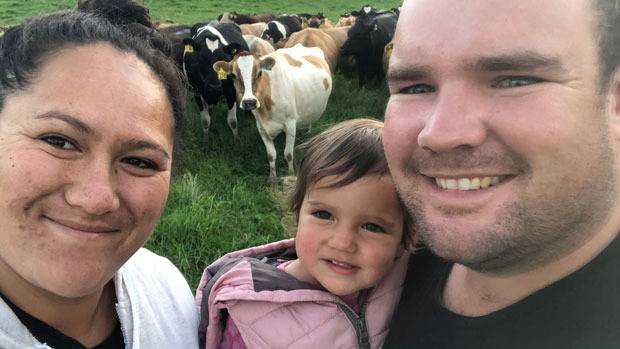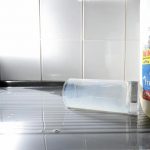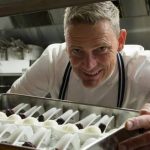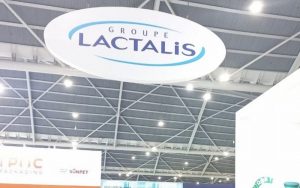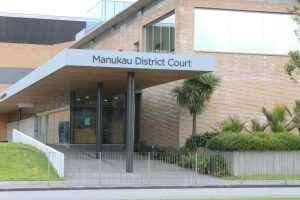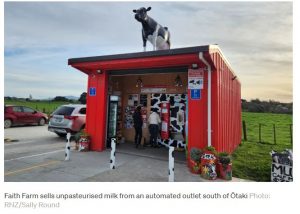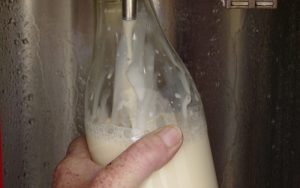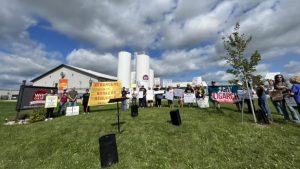
The 31-year-old is in his second season 50:50 sharemilking 150 cows near Wellsford in Northland.
The job is small by industry standards. The region’s average herd size is 300 cows.
The situation meant Bakewell – who has a Diploma in Business Studies from Massey University – had to investigate ways to generate extra income.
The farm’s rolling hills overlook State Highway One, where an estimated 15,000 vehicles zap past every day.
The Kaipara Young Farmers member saw the steady stream of cars as an opportunity waiting to be tapped.
In August 2018, after months of planning and hard work, a vending machine dispensing raw milk opened on the farm.
“We sold 30 litres of milk on the first day and we’ve sold milk every day since,” said Bakewell.
“We sell an average of 100 litres a day.”
The shiny stainless steel machine is one of only 15 in New Zealand providing consumers with access to unpasteurised milk.
“It baffles me that there are more than 10,000 dairy farms in this country, yet there are only 26 registered raw milk suppliers,” he said.
Herd owning sharemilkers only receive half the monthly milk cheque and Bakewell’s business idea was driven by economics.
“I’m a big believer in getting creative and thinking outside the box to make business opportunities work,” he said.
The herd is split in two. About 130 cows are milked once-a-day and their milk is bought by dairy giant Fonterra.
A further 17 cows are run in a separate mob and their milk is used to supply the vending machine which customers can access 24/7.
The raw milk business – known as Bakewell Creamery – is operated by Bakewell and his wife Jaye. Bakewell’s parents have also invested in the venture.
“We pay the farm’s owner Duncan Johnson a rate per litre for milk sold through Bakewell Creamery,” said Bakewell.
The milk dispensing machine – which cost $100,000 – is housed in a small purpose-built, transportable shop at the front of the farm.
The milk is sold for $3 a litre. Reusable glass bottles can be bought from a second vending machine for $5.
The venture was also driven by Bakewell’s desire to have a stronger connection with consumers of his milk.
“They’re so grateful and appreciative. Nothing gives me a bigger buzz than hearing how much people love our milk,” he said.
Bakewell uses social media to market the business and is exploring opportunities to expand his customer base.
The farm is only 45 minutes from Auckland, which is home to a ballooning population of 1.6 million people.
“My goal is to supply raw milk into Auckland. Imagine being able to buy fresh cows’ milk in Remuera or Ponsonby,” he said.
“It would be a fantastic way for us as farmers to connect with people who probably don’t give a lot of thought to where milk comes from.”
Current regulations prevent the company from setting up raw milk vending machines in Auckland.
“Until the rules change, our only option to get our fresh milk into Auckland fridges is to bottle it and deliver it. That would be quite labour intensive,” said Bakewell.
“But we’re in discussions with other companies that deliver to homes in Auckland.”
“One option could be that a bottle of our raw milk is included in produce boxes,” he said.
Going from dairy farmers to raw milk producers has been a steep learning curve for the Bakewell’s.
They’ve been guided by Richard Houston, who started Village Milk in Golden Bay in 2012 after importing the first vending machine from Italy.
“Hiring Richard as a consultant was a no-brainer,” said Bakewell.
“I don’t think we would have been selling milk as early as we were without his guidance and expertise.”
Normal milk sold in supermarkets is pasteurised to kill any bacteria.
Raw milk is unprocessed, which means stringent hygiene practices are needed when the milk is harvested to ensure it’s free of bad bacteria.
“Richard showed us how to carefully wash, disinfect and dry each cow’s udder prior to milking,” he said.
“Before we started the raw milk business we also replaced every piece of rubberware in our milking plant and overhauled our cleaning procedures.”
The business is registered with the Ministry of Primary Industries and undergoes a food safety inspection twice a year.
It’s also inspected a third time to ensure it meets Fonterra’s conditions of supply.
“It’s completely different to traditional dairy farming, where you just put your milk in the vat and leave the rest to someone else,” he said.
Bakewell reckons supplying raw milk would suit younger farmers who are social media savvy.
But he said they have to have access to a big customer base and be prepared to put in extra work.
“We’re only limited by our imagination as to where this goes,” said Bakewell.
“Our vending machine is just the start and I’m enjoying the journey that we are on at the moment.”
